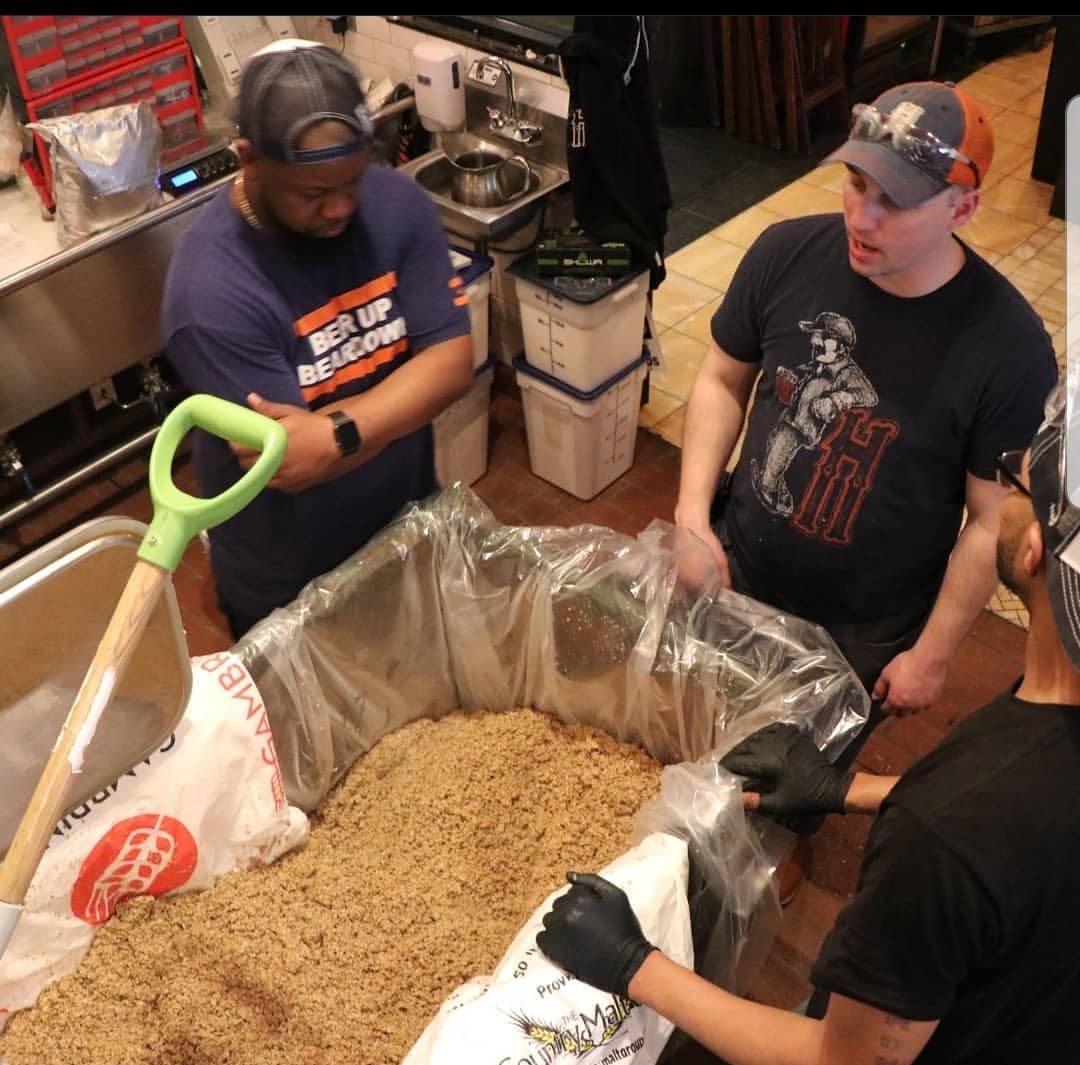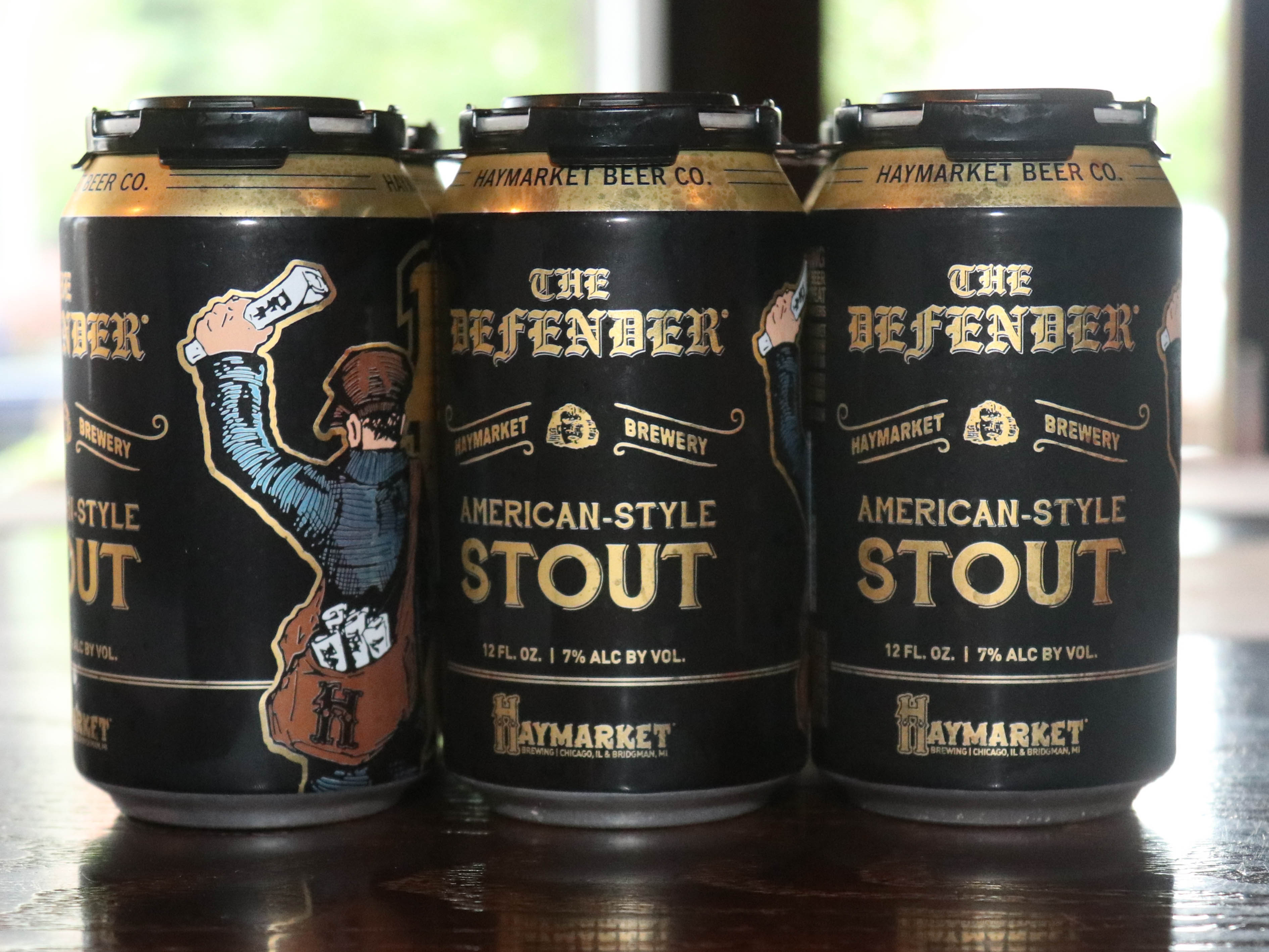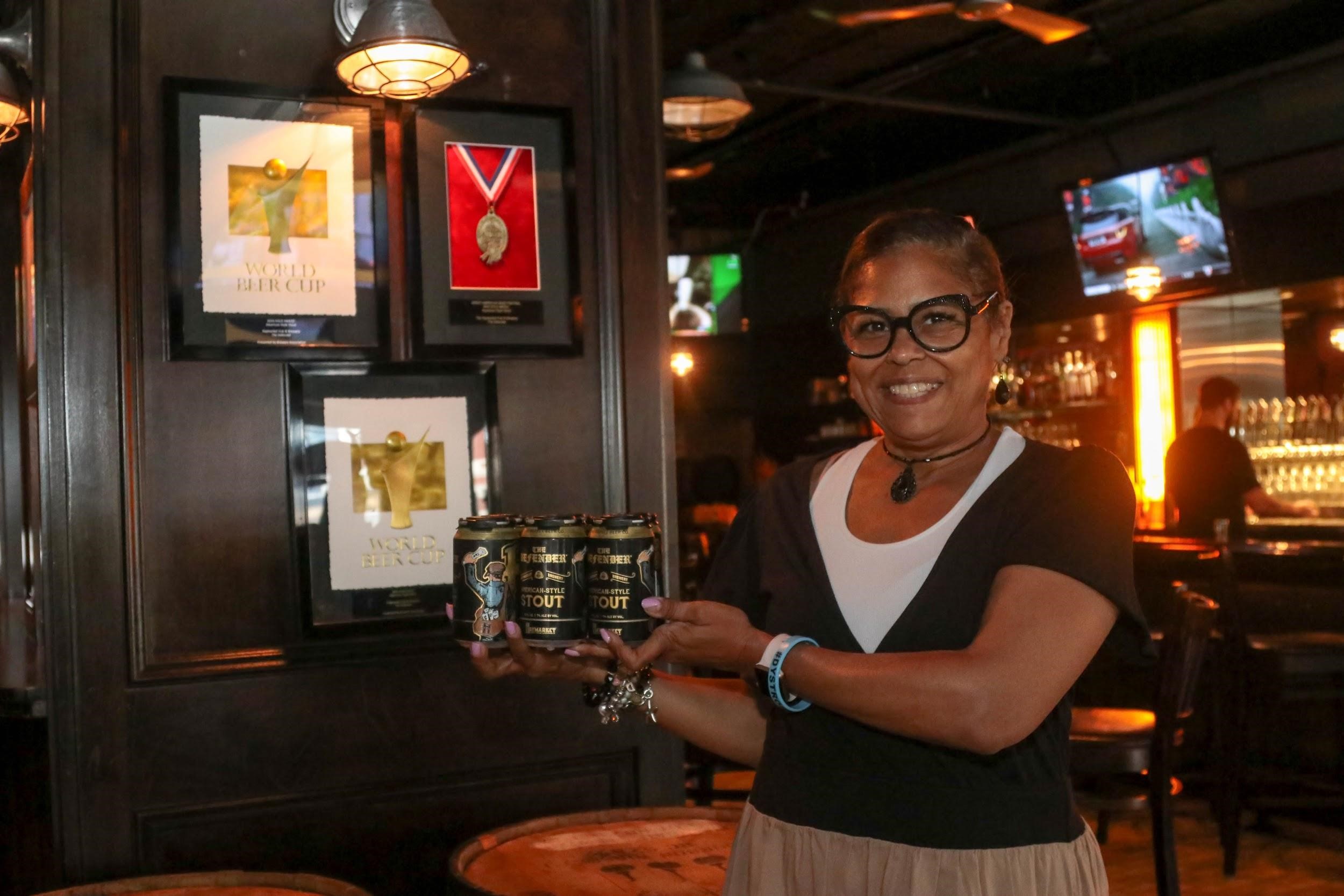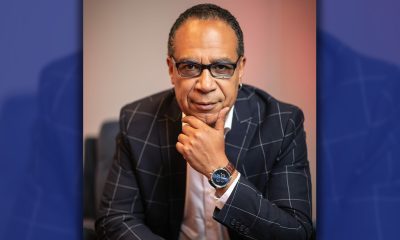#NNPA BlackPress
Haymarket’s Brew Day with Jay West and Sam Ross A Conversation about Industry’s Lack of Diversity, a New Ale and a special Brew in honor of the Chicago Defender.
THE CHICAGO DEFENDER — Harold’s ’83 Honey Ale will be available at Haymarket Pub & Brewery. Haymarket offers a variety of innovative house ales and lagers, including an award-winning stout, to honor the historic African American publication, the Chicago Defender newspaper. “We named the beer to pay homage to this long-standing circular,” says Haymarket Head Brewer Pete Crowley. “Most of our beer names are of historical significance to Chicago…” Stay tuned for more details about the release of Sam Ross’s and Jay West’s Harold’s ’83 Honey Ale. Haymarket Pub and Brewery is located at 737 W. Randolph Street, Chicago, 60661.
By Kelly Washington, The Chicago Defender

Chicago and the country have experienced an enormous craft beer boom in recent years. Although craft brewing is a booming industry, with diverse offerings in classic lagers and ales, there is a stunning lack of diversity as it pertains to African-Americans in the brewing industry. The Brewers Association put out a benchmarking survey in 2018 on brewery owners and employee diversity. This survey showed that only 1% of independent breweries in the U.S. were owned by Blacks or African Americans. In addition, less than 1% of brewers in the U.S. were Black or African American. Jay West and Sam Ross approached Haymarket Pub & Brewery to create a beer that would help to raise awareness of the lack of diversity in the brewing industry and begin a conversation about diversity in the craft beer community.
Kelly Washington (KW) – Tell me more about your project.
Jay West (JW) – When I was approached with this project, I knew Sam Ross was the one to join me in this journey. It is a shared dream that we did not realize was a shared dream at the time. We wanted this beer to be very Chicago. We also knew how much African Americans consumed beer, however, from the manufacturing to the selling; we are not represented in this industry.
Sam Ross (SR) – The style of beer that we are making is not very common. I wanted us to stand out. We wanted this to be a solid beer for solid beer drinkers of all kinds. We wanted our brand to be unapologetically Midwest and unapologetically urban.
KW: You said you want your beer to be “very Chicago.” Tell me more about your ale, and where the ingredients are being sourced from.
SR: It is going to be a honey ale! Not many Chicago breweries are working with honey. Working with that ingredient is another whole process. We wanted locally sourced honey. We reached out to Sweet Beginnings, a company in North Lawndale, which produces a line of all natural, raw honey products. Sweet Beginnings is a company that has turned an undevelopable plot of land near Chicago’s O’Hare International Airport into a thriving business by employing many former convicts, a segment of the population that often faces significant barriers to employment.
JW: We want to keep our beer local and, at the same time, give back to the community and help those that are ignored and underserved. We also want to educate them on this industry.
KW: The Brewer’s Association benchmarking survey suggests that African Americans own less than 1% of independent breweries. What do you see as the issue, and what can companies do to increase the visibility of more African American workers in this industry?
SR: This industry blew up in 2015! No one was prepared to start training brewers. Assistant brewers became brewers, and brewers became brew owners. Breweries are hiring like crazy, but 80% of those jobs are rarely posted due to nepotism. This industry is heavy on that practice. It also takes a lot of money to learn how to brew, so that is another barrier for African Americans. The guys at Haymarket taking time to show us this process means everything. The industry needs to take chances. Take a calculated risk.

KW: How do you two plan to use your new roles to improve the industry?
JW: I will use my platform to reach out to other people of color and educate them on this industry, and bring them on this journey. Some people took chances on me, and I want to pay that forward. This is the first time Sam is hearing this, but the education he bestowed upon me is profound. I am a better person, a better brewer, and a better conveyor of what this game can bring to the community.
SR: The best way for me is to use my role is by utilizing social media. That is how I will get our message across. I have a blog called “The Brother at the Bar.” I want us to connect through our love and knowledge of beer. Social media is an excellent vessel for that. I am in love with the craft beer world, and I want people who look like me to love it and have a great experience as well.
KW: Drumroll!!! What is the name of your ale?
JW: The name of the beer is Harold’s ’83 Honey. The name itself is paying homage to the first Black mayor of Chicago, Harold Washington. We are also tipping our hats to another Chicago institution, Harold’s Chicken. That is what we mean when we say we want our brand to be unapologetically Chicago and urban. Clearly, we want to highlight the lack of diversity, the best way to do that is to get someone’s attention, and that is what the name does. It says Chicago. It says Black Chicago.

SR: The number ‘83 is the year he (Harold Washington) became mayor. Harold’s Chicken is in Atlanta now, and that is another one of the ways we can expand our reach. We want our consumers to drink Harold’s ‘83 Honey Ale with their order of chicken, with mild sauce!
KW: That sounds like a delicious pairing!
JW: It is also an attention grabber. We want you to open a dialogue on why there is a steep lack of diversity in this game. We want you to have a beer, but we want you to have a conversation. The more that we have conversations like this, the more we can progress together.
KW: Where will you be marketing and selling Harold’s ‘83 Honey Ale?
JW: There are nine African American owned places with liquor licenses in this vast city. That is another issue within itself. I doubt that any of them will refuse this beer because it is going to be amazing! We will enlist them to help us get the word out about our ale and awareness about the lack of diversity in the brewing industry.
SR: Just being able to have our beer at an established place such as Haymarket is great. People travel from all over to come and see this place. People will come from all over to have a good beer.

Harold’s ’83 Honey Ale will be available at Haymarket Pub & Brewery. Haymarket offers a variety of innovative house ales and lagers, including an award-winning stout, to honor the historic African American publication, the Chicago Defender newspaper. “We named the beer to pay homage to this long-standing circular,” says Haymarket Head Brewer Pete Crowley. “Most of our beer names are of historical significance to Chicago…” Stay tuned for more details about the release of Sam Ross’s and Jay West’s Harold’s ’83 Honey Ale. Haymarket Pub and Brewery is located at 737 W. Randolph Street, Chicago, 60661.
The post Haymarket’s Brew Day with Jay West and Sam Ross A Conversation about Industry’s Lack of Diversity, a New Ale and a special Brew in honor of the Chicago Defender. appeared first on Chicago Defender.
#NNPA BlackPress
LIVE! — HE SAID, HE SAID, HE SAID: APRIL FOR THE ARTS 2025, MARIA LANA QUEEN — FRI. 4.25.25 7PM EST
Tune in Friday, April 25, 2025 @ 7pm EST for another live new episode of “He Said, He Said, He Said Live!” A Look at the World …

https://youtube.com/watch?v=kjPIugVQCAg&autoplay=0&cc_lang_pref=en&cc_load_policy=0&color=0&controls=1&fs=1&h1=en&loop=0&rel=0
Tune in Friday, April 25, 2025 @ 7pm EST for another live new episode of “He Said, He Said, He Said Live!” A Look at the World …
#NNPA BlackPress
The Marathon
Headlines and Cory Booker. LET IT BE KNOWN NEWS | We amplify Black voices and headlines that reflect or impact the Black …

Headlines and Cory Booker. LET IT BE KNOWN NEWS | We amplify Black voices and headlines that reflect or impact the Black …
#NNPA BlackPress
Hot Topics and Headlines
The WHCA board has unanimously decided we are no longer featuring a comedic performance. Lonnie Bunch III is speaking out …

The WHCA board has unanimously decided we are no longer featuring a comedic performance. Lonnie Bunch III is speaking out …
-

 Activism4 weeks ago
Activism4 weeks agoOakland Post Endorses Barbara Lee
-

 Activism3 weeks ago
Activism3 weeks agoOakland Post: Week of April 2 – 8, 2025
-

 #NNPA BlackPress3 weeks ago
#NNPA BlackPress3 weeks agoTrump Profits, Black America Pays the Price
-

 Activism2 weeks ago
Activism2 weeks agoOakland Post: Week of April 9 – 15, 2025
-

 #NNPA BlackPress3 weeks ago
#NNPA BlackPress3 weeks agoHarriet Tubman Scrubbed; DEI Dismantled
-

 #NNPA BlackPress3 weeks ago
#NNPA BlackPress3 weeks agoTrump Targets a Slavery Removal from the National Museum of African-American History and Culture
-

 #NNPA BlackPress3 weeks ago
#NNPA BlackPress3 weeks agoLawmakers Greenlight Reparations Study for Descendants of Enslaved Marylanders
-

 #NNPA BlackPress3 weeks ago
#NNPA BlackPress3 weeks agoNew York Stands Firm Against Trump Administration’s Order to Abandon Diversity in Schools
























































